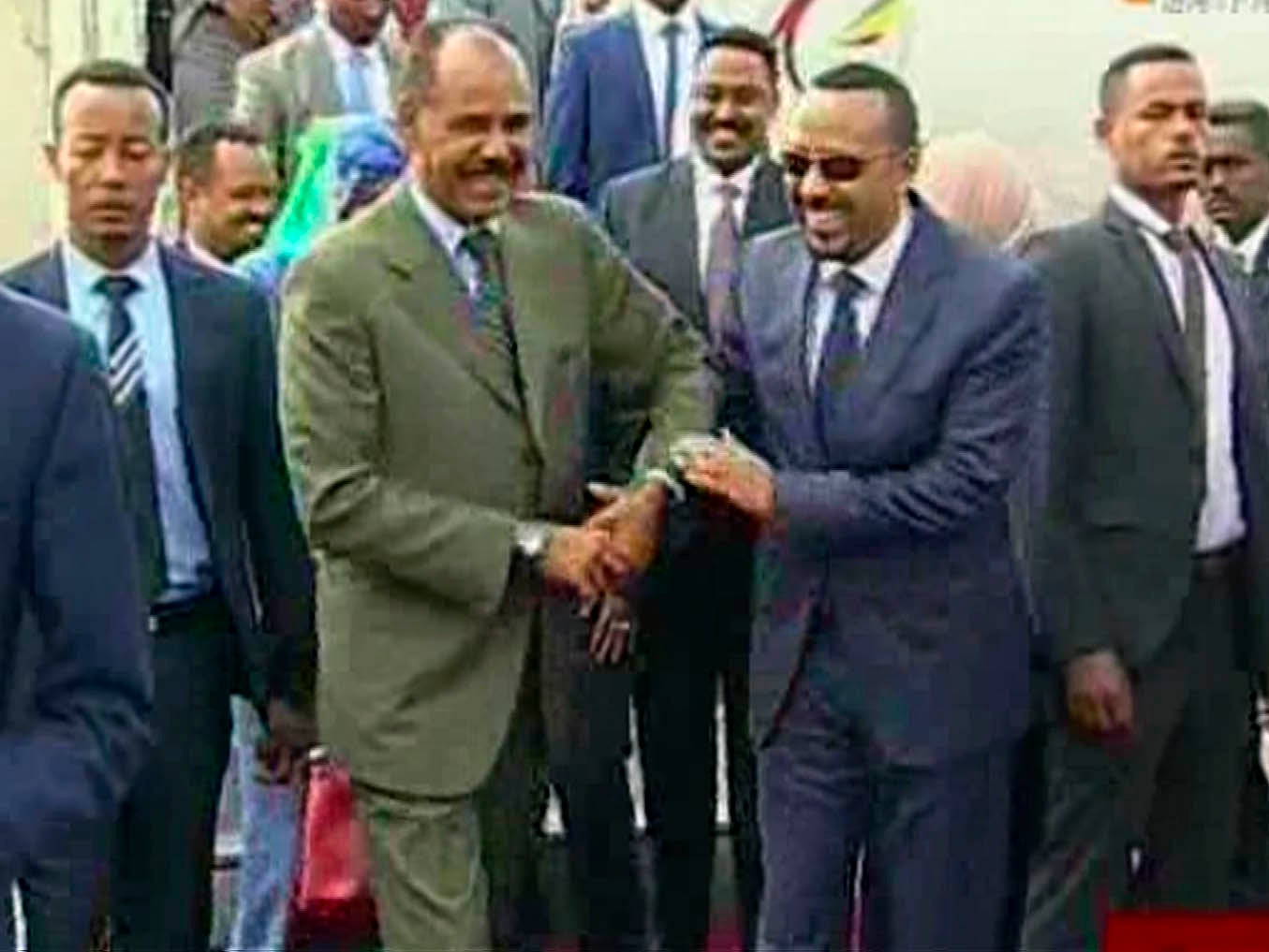Ethiopian and Eritrean leaders share hugs and laughter in momentous first meeting for decades
Visit comes month after a peace deal that ended a two-year border war between neighbouring countries

Your support helps us to tell the story
From reproductive rights to climate change to Big Tech, The Independent is on the ground when the story is developing. Whether it's investigating the financials of Elon Musk's pro-Trump PAC or producing our latest documentary, 'The A Word', which shines a light on the American women fighting for reproductive rights, we know how important it is to parse out the facts from the messaging.
At such a critical moment in US history, we need reporters on the ground. Your donation allows us to keep sending journalists to speak to both sides of the story.
The Independent is trusted by Americans across the entire political spectrum. And unlike many other quality news outlets, we choose not to lock Americans out of our reporting and analysis with paywalls. We believe quality journalism should be available to everyone, paid for by those who can afford it.
Your support makes all the difference.With laughter and hugs, the leaders of longtime rivals Ethiopia and Eritrea met for the first time in nearly two decades Sunday amid a rapid and dramatic diplomatic thaw.
Ethiopia’s reformist new prime minister Abiy Ahmed arrived in Eritrea’s capital and a live broadcast by Eritrea’s state television showed president Isaias Afwerki greeting him at the airport in scenes unthinkable just months ago.
Crowds danced and sang for the leaders, and Asmara’s streets were hung with Ethiopian and Eritrean flags. Mr Ahmed and Mr Afwerki then travelled across the capital in a large motorcade as people wearing T-shirts with photos of the two leaders cheered. The leaders later met one-on-one, with a smiling Mr Ahmed leaning towards Mr Afwerki under a wall hung with their portraits.
The visit comes a month after Mr Ahmed surprised people by fully accepting a peace deal that ended a two-year border war between the two countries. Ethiopia and Eritrea have not had diplomatic ties since the war began in 1998, with Mr Ahmed himself fighting in a town that remains contested today, and the countries have skirmished since then in one of Africa’s longest-running conflicts.
Mr Ahmed’s chief of staff, Fitsum Arega, said on Twitter that the visit aims to “further deepen efforts to bring about lasting peace.” He shared photos of the leaders’ meeting and said Mr Ahmed was “very warmly received” by Mr Afwerki.
“Our two nations share a history and bond like no other,” he said. “We can now overcome two decades of mistrust and move in a new direction.”
Ethiopia’s foreign ministry called the visit “part of efforts to normalise relations with Eritrea” and said Mr Ahmed was expected to talk with Eritrea’s leadership about “how to mend fences”.
One Eritrean diplomat, its ambassador to Japan Estifanos Afeworki, said on Twitter that “no leader has received such a warm welcome like today in Asmara in the history of Eritrea”.
Ethiopians expressed welcome shock at the meeting, which was shown live by Ethiopia’s state TV.
“Historic ... the beginning of the end. The glass ceiling has been broken,” one resident, Shewit Wudassie, wrote on Facebook. Another Facebook user, Djphat Su, wrote: “Am I dreaming or what?”
The decision to fully accept the peace deal was the biggest and most surprising reform yet announced by Ethiopia’s 42-year-old prime minister, who took office in April and quickly set off a wave of reforms, freeing journalists and opposition figures from prison, opening up the state-run economy and unblocking hundreds of websites after years of anti-government protests demanding more freedoms.
Days after the announcement, Eritrea’s Mr Afwerki noted “positive signals” from Ethiopia and sent the first official delegation in two decades to “gauge current developments directly and in depth” to plan future steps. Ethiopia used the visit to announce that flagship Ethiopian Airlines would soon begin flights to Eritrea.
While Ethiopia is Africa’s second most populous nation and one of the world’s fastest-growing economies, tiny Eritrea is one of the world’s most closed-off nations, ruled by Mr Afwerki since gaining independence from Ethiopia in 1993 after years of rebel warfare. But the two countries share close cultural ties.
Eritrea has become a major source of migrants fleeing towards Europe, Israel and African nations in recent years as human rights groups criticise its harsh military conscription laws.
Observers of the diplomatic thaw have asked whether peace with Ethiopia would lead Eritrea to loosen up and drop its long defensive stance.
Associated Press
Join our commenting forum
Join thought-provoking conversations, follow other Independent readers and see their replies
Comments